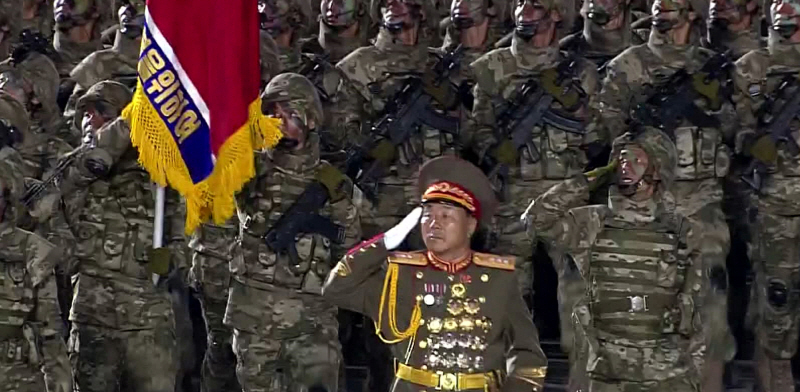South Korea’s intelligence agency has reported that North Korean leader Kim Jong-un has heightened security protocols amid concerns of potential assassination threats. Additionally, North Korean authorities have reportedly instructed soldiers deployed to Ukraine’s front lines, along with their families, to maintain strict secrecy about the mission.
On October 29, South Korea’s National Intelligence Service (NIS) disclosed that North Korean soldiers deployed to Russia are encountering communication difficulties as they struggle to understand over 100 military terms being taught by the Russian military.
“It remains unclear whether this issue will be resolved,” the NIS reported.

In a closed-door session held at the National Assembly Intelligence Committee in Seoul, the NIS provided an update on North Korean troop deployments to the Ukrainian conflict. The NIS stated, “Approximately 3,000 North Korean soldiers have been deployed to Russia so far,” with an estimated total deployment expected to reach 10,900, including additional reinforcements.
Most deployed soldiers are believed to be in their early twenties, with some in their late teens. The NIS cautioned against underestimating their combat capabilities, as they likely received essential combat training as part of the “Storm Corps,” North Korea’s specialized military unit.
Furthermore, the NIS shared intelligence suggesting that a North Korean advance team, including Deputy Chief of the General Staff Kim Yong-bok, might soon move to the front lines, indicating an imminent deployment to the Kurst region. Located in southwestern Russia, Kursk has been a hotbed of recent fighting following Ukrainian advances in August.
Representative Lee Seong-kwon of the People Power Party added that North Korea has banned military officers from using cell phones to prevent leaks and has instructed soldiers and their families to remain discreet about the deployment, reportedly telling families that their relatives are simply “going for training.” There is also evidence of dissent within North Korea, with some expressing frustration over being forced to fight in a foreign war.

The NIS also mentioned that they are considering the deployment of observer teams for security monitoring, particularly since modern warfare tactics, such as drone and electronic warfare, could pose unique challenges for North Korean forces. The NIS affirmed the potential need for interrogation teams if North Korean soldiers were to be captured or defect.
On North Korean leader Kim Jong-un, the NIS reported enhanced security measures due to concerns of potential assassination threats.
According to Representative Park Sun-won of the Democratic Party, Kim’s public appearances have increased by 60% this year, along with new security measures like signal jamming vehicles and drone detection equipment. North Korea has also recently ceased the use of the “Juche” era calendar and is shifting emphasis onto Kim’s revolutionary history, suggesting a move toward further consolidating his personal authority.

The NIS further reported that Kim’s daughter, Ju-ae, has seen an elevated status, often seen with prominent North Korean figures like Kim Yo-jong, Kim’s sister, and Foreign Minister Choe Son-hui, indicating her growing role in the regime. Recent photos of Ju-ae with Kim Jong-un and her direct interactions with the Russian ambassador imply her stable position in North Korea’s hierarchy.
The NIS also revealed that North Korea is preparing another reconnaissance satellite launch attempt, following a failed attempt in May. Meanwhile, North Korean-Russian relations are strengthening, with an estimated 4,000 North Korean workers deployed to Russia this year alone. While wages for North Korean workers are around $800 per month, soldiers are reportedly paid $2,000.
On North Korea’s relationship with China, the NIS acknowledged tensions but speculated that North Korea likely notified China of its military cooperation with Russia. Additionally, the NIS noted the possibility of North Korea testing a hypersonic intermediate-range ballistic missile (IRBM) and an intercontinental ballistic missile (ICBM) following the U.S. election, with a seventh nuclear test potentially on the horizon.
BY BOHYUN KANG, YOUNGNAM KIM [kim.youngnam@koreadaily.com]





